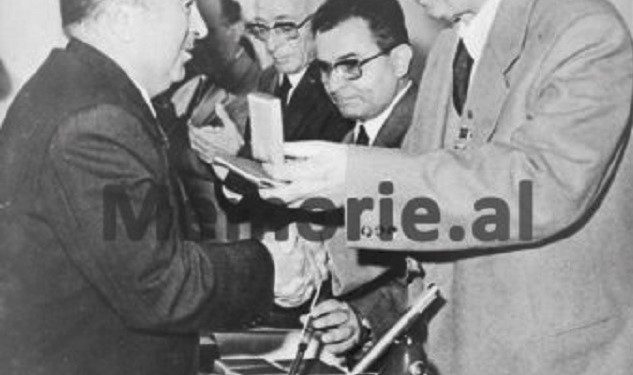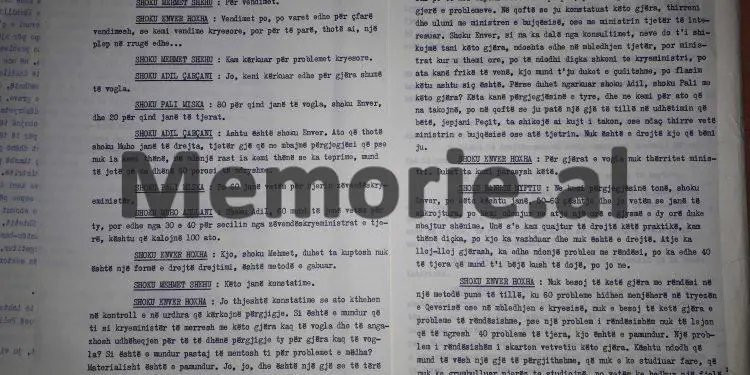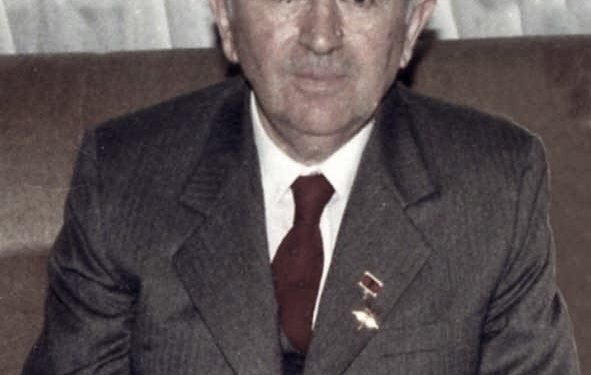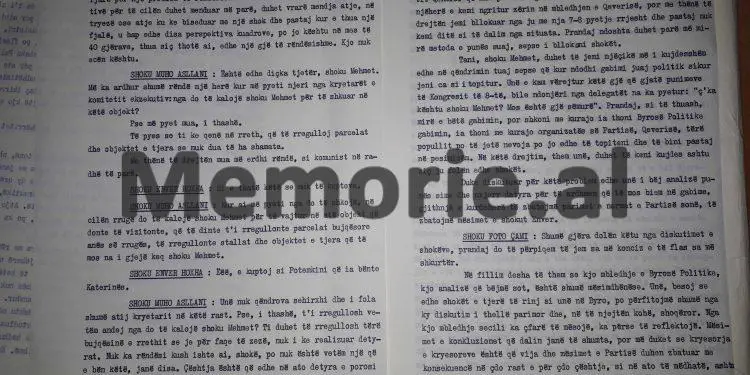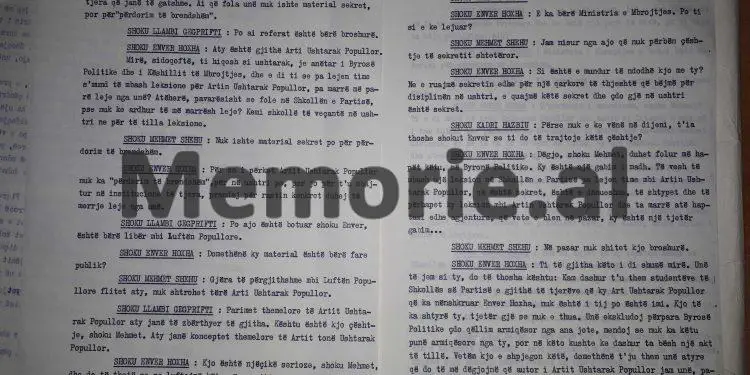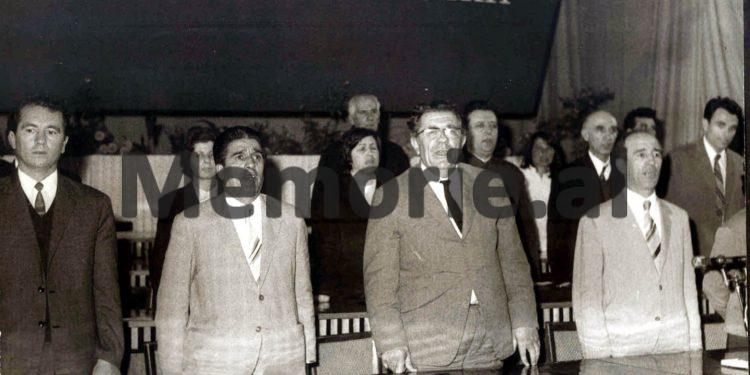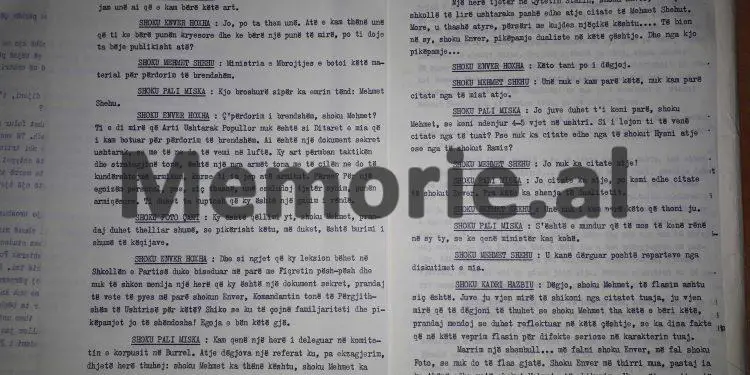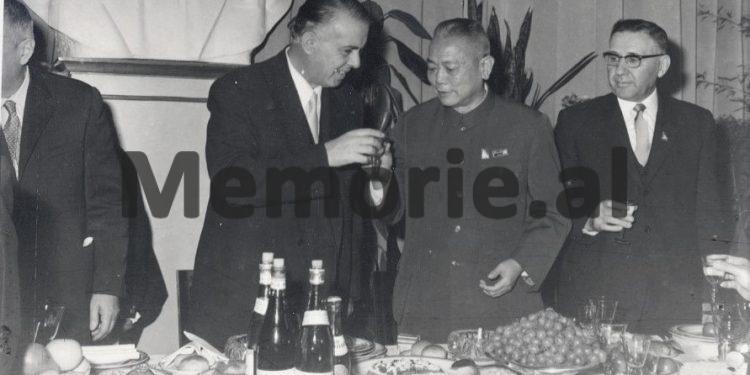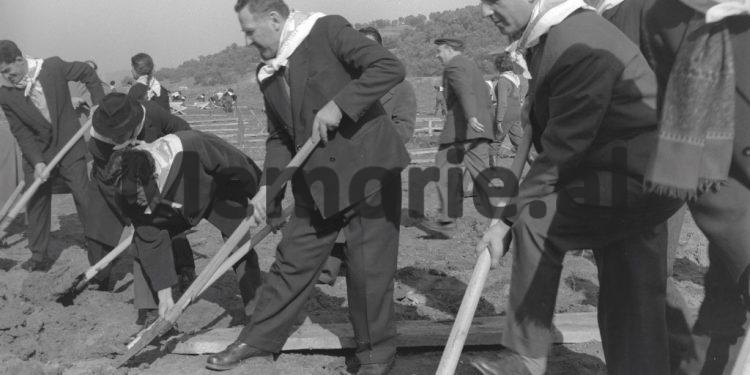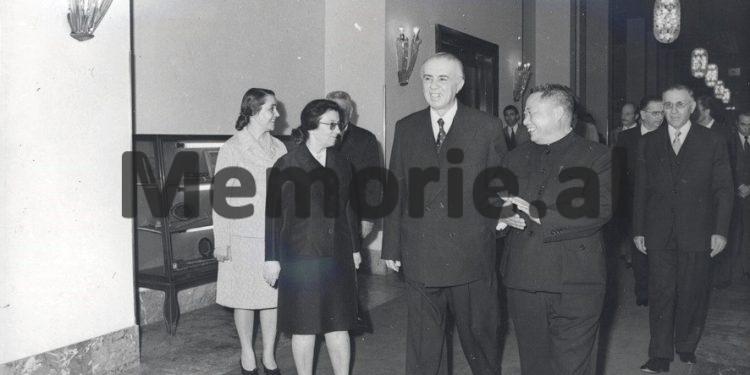Dashnor Kaloçi
Part forty
Memorie.al publishes some documents issued by the Central State Archive (fund of the former Central Committee of the ALP), where there is a voluminous file with archival materials which bear the logo ‘Top secret’, which belong to the period of years 1981-1982, with reports, reports, evidence, information, minutes of the meetings of the Politburo and the secretariat of the Central Committee of the ALP, etc., starting from what was held to review and analyze the self-criticism of the former Prime Minister Mehmet Shehu in December 1981, because he had allowed the engagement of his son, Skënder, “with a girl who had some political fugitives in her family circle”, the marathon meeting of the Politburo on the afternoon of December 17 his year that lasted until the late hours of that night, where that problem was discussed with the debates and discussions of all members who “crucified” former Prime Minister Shehu, the meeting of the morning of December 18, after the news that Prime Minister Mehme Shehu had killed himself, the marathon meeting of the Secretariat of the Central Committee of the ALP on September 20, 1982, with the topic: “Analysis of serious mistakes of Kadri Hazbiu, committed during the period when he was deputy minister and minister of Internal Affairs “, where Enver Hoxha initially launched accusations against Kadri Hazbiu, luring him as a” loyalist of the Party “, (in order for him to” open the heart of the Party “, speaking against former Prime Minister Mehmet Shehu) , where at the beginning of his speech, Enver said: “After the coup in the army, we discovered the traitorous group in economics of Abdyl Këllez, Koço Theodhos and Kiço Ngjela with friends. We also discovered this group here; it was not discovered by the State Security. The same can be said about the discovery of the group of Fadil Paçrami, Todi Lubonja and a number of other people connected with them, such as Ismail Kadareja with friends, the Security did not reveal, but that hostile work was discovered by the Committee Central, etc. ”! All these and other documents with the logo ‘Top secret’, will be published in several issues in a row, exclusively by Memorie.al.
Continued from the previous issue
ALBANIAN LABOR PARTY
CENTRAL SECRETARY COMMITTEE
-General Sector-
PROCESS – VERBAL
OF THE MEETING OF THE POLITICAL BUREAU OF THE CENTRAL AFFAIRS OF THE ALP DATES
17 E 18 DECEMBER 1981
Agenda: Analysis of the serious mistake made by the member of the Politburo, Mehmet Shehu, regarding the engagement of a boy with a girl with a very bad political composition.
This meeting is attended by all members of the Politburo, with the exception of Comrade Hekuran Isai, who did not come because his mother died last night.
COMRADE MUHO ASLLANI: We talked to Comrade Adil, but we said well, let it be as it is, we will explain it to Comrade Mehmet and so the nursery remained.
You do well not to remain indifferent, Comrade Mehmet, to many troubles wherever you go. In my opinion do well when you fix these problems, look at them and discuss them together and decide on them collegially. But these remarks, these messages, these problems, raised by comrade Mehmet, are not one or two, but dozens, if not more, even once exceed 50 typed pages.
These problems, from the smallest to the biggest and when I say from the smallest, starting from the women’s pins, street poplars, to the biggest, block the deputy chairmen of the Council of Ministers, block the whole apparatus , block all departments, because you, then have to answer for all.
Of course you are good at this, because you give orders and you have to give answers, you have to report on what you said, but as I said, for these problems the apparatuses are blocked, the ministries are blocked. We also discussed with our fellow deputy chairmen of the Council of Ministers, but we did not provide a solution to this working method, because in order to follow these problems, and to prepare the answers of Comrade Mehmet, in addition to us, a friend from the Inspection was assigned of the State, the best man, the most prepared man, the secretary of the organization – the Party base of this institution, only to prepare, as it were, responsible for Comrade Mehmet, after preparing the other sectors.
COMRADE ENVER HOXHA: For these little things.
COMRADE MUHO ASLLANI: These little ones, because if it was for the decisions of the Government, for the decisions of the Presidency and the Politburo of the Central Committee, this is right and should be done.
COMRADE ENVER HOXHA: That is to say, these questions come to you with a form.
COMRADE MEHMET SHEHU: About the decisions.
COMRADE ENVER HOXHA: The decisions are yes, it also depends on what decisions, because we have main decisions, but to see, he says, a popular in the street…!
COMRADE MEHMET SHEHU: I asked about the main problems.
COMRADE ADIL ÇARÇANI: No, you also asked for very small things.
COMRADE PALI MISKA: 80 percent are small, Comrade Enver, and 20 percent are other.
COMRADE ADIL ÇARÇANI: So is Comrade Enver. What Comrade Muho says is right, another thing we are responsible for is why we did not tell him, in some cases we told him that there are exaggerations, it may be that he gave 60 different orders.
COMRADE PALI MISKA: Yes, 60 are only for one deputy prime minister.
COMRADE MUHO ASLLANI: Comrade Adil, 60 can be only for you, but also 30 and 40 for each of the other deputy prime ministers, so 100 of them pass.
COMRADE ENVER HOXHA: This, Comrade Mehmet, you must understand is not a right form of leadership, it is the wrong method.
COMRADE MEHMET SHEHU: These are findings.
COMRADE ENVER HOXHA: Not simple findings, that they return to control and orders that require answers. How is it possible that you, as Prime Minister, deal with these small things and engage the leadership to give you answers, for such small things?! How is it possible then to think about big problems? It is materially impossible. No, no, and it’s one thing, that we have all gone down…!
COMRADE KADRI HAZBIU: One more thing, Comrade Mehmet, why do not you work with the ministers? Well, you saw the issue of poplars, why did not you call the Minister of Agriculture, Themien, and raise the issue with him? Forgive me, if we do not cling only to the poplars, if we cling to the whole wide range of problems. If you find these things, call and sit down with the Minister of Agriculture, or the other minister interested.
Comrade Enver, as it turned out from the consultations, we will look at these things now, maybe in the next meeting, but the ministers, when we tell them the hour, if something happens, go to the prime minister, but they are afraid to come, this may seem strange to you, we are talking here as it is.
Why should Comrade Adil, Comrade Paul, be charged with these things? These have their responsibility and we have for what belongs to us, but if you saw such a thing in the trip you made, give it to Peçi, let him see who it belongs to, or if he called the Minister of Agriculture or him the other. It’s not fair what you do.
COMRADE ENVER HOXHA: The minister is not called for small things. We need to keep this in mind.
COMRADE MANUSH MYFT: We have our responsibility, Comrade Enver, yes these are, 50-60 issues and not only are they written, but we stayed there for an hour and a half and two hours, keeping notes. I did not call this practice right, I said something, but it has continued and it is not right. There are all kinds of things there, there are some important problems, but there are 40 others that anyone can do, but not us.
COMRADE ENVER HOXHA: I do not believe that there are important things in such a working method, where 60 problems are immediately thrown on the table of the Government, or in the meeting of the Presidency, he does not believe that there are important things and problems, why an important problem, does not allow you to raise 40 more problems, this is impossible.
COMRADE MUHO ASLLANI: There is something else, Comrade Mehmet. I was very upset once, when one of the chairmen of the Executive Committee asked me: where wills Comrade Mehmet go to go to this facility?
Why do you ask me, I told him?
I ask you, that you have been in the district, to arrange the parcels and other facilities that I do not want to eat shamata.
To be honest, it was hard for me, as a communist in the first place.
COMRADE ENVER HOXHA: How did you say that, because I did not understand you?
COMRADE MUHO ASLLANI: When he asked me where he was going, which road Comrade Mehmet would cross, to go to the facility he wanted to visit, to know how to arrange the agricultural plots on the side of the road, to fix the stables and other objects, so that Comrade Mehmet does not feel bad for us.
COMRADE ENVER HOXHA: Wow, understand, like Potemkin he did to Catherine.
COMRADE MUHO ASLLANI: I did not stand by and watched a lot to that mayor in this case. Why, I said, fix them only there, where will comrade Mehmet go? You have to fix the whole agriculture of the district, because you are for the black page, you have not completed the tasks. It does not matter who he was, friend, but he is not the only one who does this, there are several. The point is that even in those tasks and messages that you give, you insist then, as one of your friends said, that either what you say or do will not be done.
Now, comrade Mehmet, you have to be a little more careful in your attitude as well, because since your political mistake happened, you seem to be a bit dumb. I have noticed this that during the proceedings of the 8th Congress, even one of the delegates asked us: “What is the matter with Comrade Mehmet? “It’s not a sick thing.”
Therefore, as you say, you made the mistake well, but go boldly tell the Politburo the mistake, boldly tell the organization of the Party, the Government, all the people, if necessary, but not to blunt and then fall into pessimism. In this regard, I say, you must be careful, as your friends have told you.
Discussing this problem, I also analyze my work and issue tasks for the future, so that we do not fall into mistakes, always apply the principles and norms of our Party, apply the teachings of Comrade Enver.
COMRADE PHOTO ÇAMI: Many things came out here from the discussions of friends, so I will try to be as concise as possible and speak as briefly as possible. Like other friends, I read carefully, even twice, the self-criticism of comrade Mehmet. When I saw it, to be honest, from the number of pages, I said that there will be an in-depth analysis, from which we will all learn, but when I read it, the self-criticism of comrade Mehmet did not satisfy me and it seems to me that there is three large gaps.
First, it does not analyze from a political and ideological point of view where the evil of the mistake made lies. What would people say and what would happen if the mistake that was made was allowed? People would say that in the Party there are two lines, there are two attitudes, one for the leaders, and another for the mass of communists and the people. From this point of view, Comrade Enver’s intervention was entirely right and proper, and the break-up of the engagement was necessary. This intervention was in the great interest of the Party, but also of Comrade Mehmet and his family, because the interests of each of us are inseparable from those of the Party.
Second, in his self-criticism, Comrade Mehmet has tried to analyze the causes that led him to this mistake, but it must be said that the emphasis is not where it should be. Emphasis is placed on sentimentality, on abducted character, on haste in making thirsty decisions. These occupy the vast majority of self-criticism, while what constitutes the basic cause is treated sparingly and only in point 7 of self-criticism, from its end.
It is very meaningful what is said in self-criticism that, if someone else had asked me, if an engagement could be done to a girl from a family with such a family circle, I would have definitely refused. Why is this talking? It speaks to that sense of superiority, of self-esteem, of arrogance, it speaks to that misconception that you can afford everything, even what others cannot and should not do. An expression of this feeling, of this concept, is the closure in itself and not consulting with friends, as well as the supposed thought of immunity from foreign influences, etc.
I think that not deepening in this fundamental cause, has led to the other gap of self-criticism, that the conclusions drawn from the mistake made, revolve mainly around this mistake and a little and in a very general form self-criticism goes out of its bounds. Comrade Enver, at the previous meeting of the Politburo, made some serious remarks about the method of work style, about which it was necessary to reflect deeply. The friends brought plenty of examples that prove that there are many things to see in this regard.
Both the overestimation of the Presidency of the Council of Ministers and its transformation, as Comrade Enver said, into a small government over the big government, and the tendencies for a pronounced centralism in the Presidency, in the Government, down to the smallest issues, in essence these are issues that have to do with the same sense of superiority of dictation, of a priori decisions, that only someone is able to judge competently, accurately, truthfully, fairly about everything. Not only the ministers, but also the chairmen of the Executive Committees of the People’s Councils of the districts, have felt the heavy atmosphere of the meetings held in the Government.
It is also meaningful the case that you mentioned comrade Adil with comrade Vito, it seems to me, when she was at the meeting of the Government, she also complained to us about this attitude that was held. She posed some problems of the women’s organization for which you also need the intervention of the Government…!
COMRADE KADRI HAZBIU: It was not his wife Vito, but his wife Hatixhe Katro.
COMRADE PHOTO ÇAMI: No, that in one case Mrs. Vito was also present, I know that Mrs. Vito came and complained, but in some other case Hatixhia was also present. She came, raised there some problems that had to do with the organization of Women, for some mitigation measures for women, problems that the Government should study and if possible think about what could be solved by them. But, instead of listening to these problems attentively, carefully, she was cut off with her front legs and held to account, saying: What are you doing in the Women’s Organization, where are you? You sleep, do nothing, what do you do here, etc.?
Comrade Enver’s remarks about Comrade Fiqret’s work at the Party School, which were made at the last meeting of the Politburo, are entirely correct. Without denying the work, her efforts and the achievements of this school, it must be said that Mrs. Fiqret, has tried to turn this important institution into something closed, in a fortress where not only outsiders, but also employees of the Central Committee, with difficulty they were able to get into her affairs.
COMRADE ENVER HOXHA: Excuse me; let me ask Mehmet a question: Is it true that you gave a lecture on Martial Folk Art at the Party School?
COMRADE MEHMET SHEHU: Yes, I have kept it for a long time.
COMRADE ENVER HOXHA: You took my permission for this as Commander-in-Chief, because that issue is a secret?!
COMRADE MEHMET SHEHU: I did not talk about it, but about other parts that are ready. The one I spoke to was not secret material, but for “internal use”.
COMRADE LLAMBI GEGPRIFTI: Yes, that paper has become a booklet.
COMRADE ENVER HOXHA: There is all the Folk Martial Art. Well, anyway, you retire as a military man, you are a member of the Politburo and the Defense Council and you know that without my permission I cannot give lectures on Folk Martial Arts without first getting permission from me? Then, despite talking at the Party School, why did not you come to get my permission? We have a special school in the Army for such lectures.
COMRADE MEHMET SHEHU: It was not a secret material, but for internal use.
COMRADE ENVER HOXHA: Regarding the Folk Martial Arts, there is no “internal use”, for the Army yes, but not to be kept in other institutions, so for the specific case, you had to get permission from me.
COMRADE LLAMBI GEGPRIFTI: Yes, it was published, Comrade Enver, it became a book on the People’s War.
COMRADE ENVER HOXHA: So this material has been made public at all?
COMRADE MEHMET SHEHU: General things about the People’s War are talked about there, not the whole Folk Martial Art is laid out.
COMRADE LLAMBI GEGPRIFTI: The basic principles of Folk Martial Art are all broken down there. This is the case, Comrade Mehmet. There are the basic concepts of our Folk Martial Art.
COMRADE ENVER HOXHA: This is a serious matter, Comrade Mehmet, and it means that we are fighting here for the preservation of state secrets, you yourself and publicly spread the principles of our Martial Art. It should be secret, not published. Even this was again done without my permission. This fact is even more serious./Memorie.al
The next issue follows




